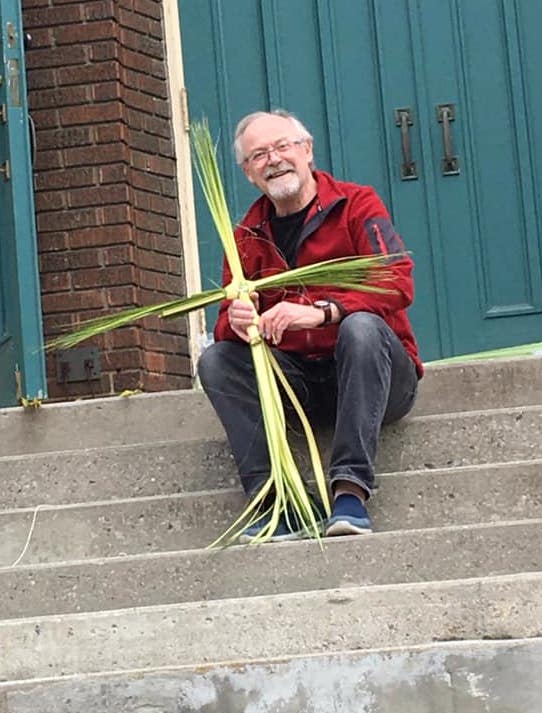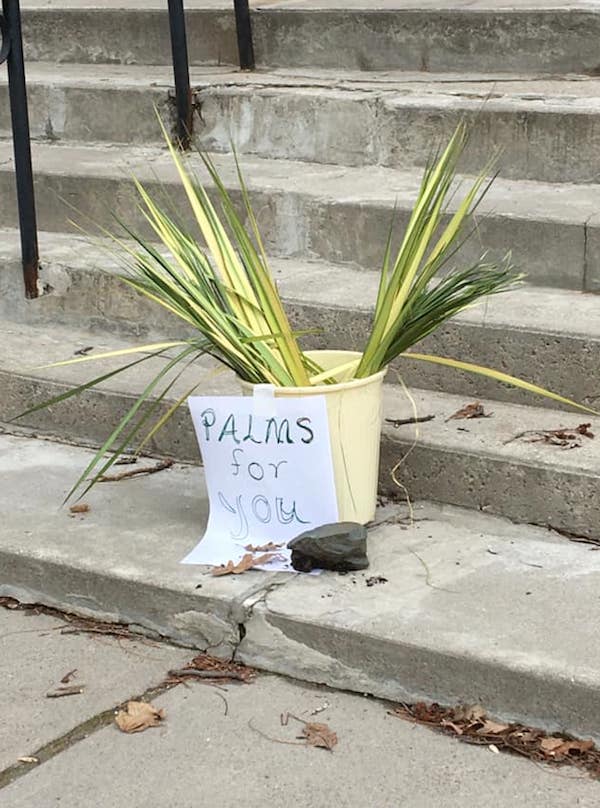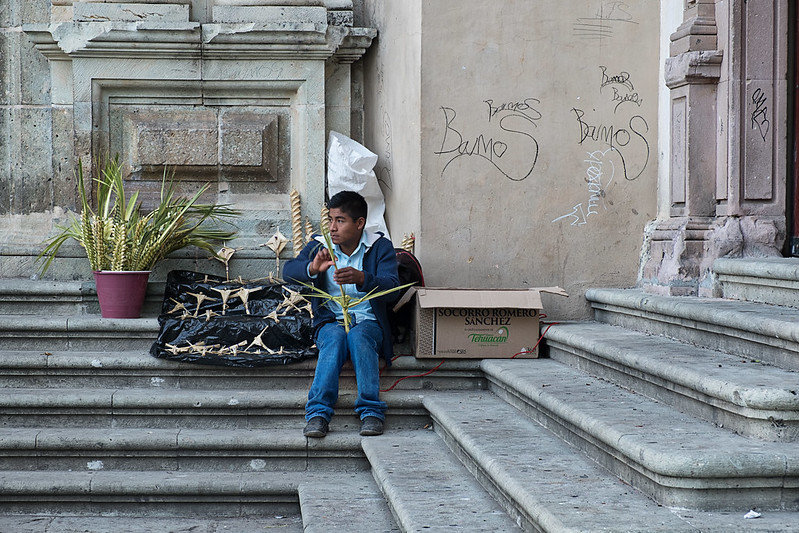It feels strange, doesn’t it, to be cooped up inside today as we hear Luke’s bustling, jubilant, and very outdoorsy account of Jesus’ triumphal entry into Jerusalem? Like so many other things, the festivities that normally make today so very special are cancelled.
Palm Sunday has been observed in the western world since the 8th century. In Jerusalem, the celebrations go back even further, all the way to the 4th century. There’s a surviving, fragmented letter called “The Pilgrimage of Etheria” that dates perhaps to the 380s and describes a Palm Sunday processional that begins on the Mt. of Olives and winds its way down into the city, with the people singing hymns, the adults carrying children on their shoulders, and all of them carrying palm or olive branches as they go. What a sight it must have been! It might have even been more spectacular than the day that Jesus actually rode into Jerusalem on a donkey.

Reading Etheria’s account of her pilgrimage and hearing Luke’s account of the triumphal entry in these days of isolation raise in me a sense of longing. Wouldn’t a parade be nice right now! To gather and celebrate, to be close to other people. Just seeing a parade go by without having to watch it on a screen would be fantastic!
I also find these stories evoking a sense of wonder. What if? What if there had been an epidemic in Jesus’ day. What if the Roman authorities had banned assemblies on that first Palm Sunday – something that they could have done for any number of reasons. Civil liberties as we know them and understand them and enjoy them didn’t exist back then. What if that first Palm Sunday had been like this Palm Sunday? What if Jesus made His way down from the Mount of Olives on His donkey all alone, with perhaps only the twelve disciples following at a safe distance, spaced two cubits apart? Would we still have something to celebrate?
Well, we certainly wouldn’t have quite the same story; and without the same story, we wouldn’t have the same traditions of palm branches and hymns, the processionals like the one Etheria witnessed that form the basis of other (albeit much shorter) palm parades in church sanctuaries around the world.

What such an alternate first Sunday of Holy Week might look like, I really can’t imagine. But I can say with confidence that, yes, we most definitely would still have something to celebrate!
The oddity of observing Palm Sunday without the parades and all the other usual trappings is a special opportunity for us to remember that those parades and trappings aren’t really what make Palm Sunday. Jesus’ arrival makes Palm Sunday. And Jesus declares that His arrival would be celebrated in the depths of creation whether a parade happened or not. As He tells the Pharisees who complained about the noise, “If these were silent, the very stones would cry out!”
Palm Sunday really can’t be stopped. The grinchy Pharisees couldn’t stop it from coming. The wider religious and political establishments couldn’t stop it from coming. So neither can a pandemic. Even if there are no parades today, Jesus is still showing up – and the stones are still crying out.
Our presence is not necessary for anything that is happening today, or that will happen this Holy Week. That’s because none of it depends on us. It all depends solely and exclusively on God’s love and God’s grace. That’s the story. “For God so loved the world that God gave God’s only Son, that whosoever believes in Him should not perish but have everlasting life”! “Indeed, God did not send the Son into the world to condemn the world, but in order that the world might be saved through Him.” Everything that is unfolding this week is unfolding through God’s will, by God’s grace, and because of God’s unbreakable, unshakable, unyielding love for you and me and all of creation.
“Everything that is unfolding this week is unfolding through God’s will, by God’s grace, and because of God’s unbreakable, unshakable, unyielding love for you and me and all of creation.”
“
And here’s the truly amazing part. The depth and breadth of God’s love means that even though we aren’t necessary – there’s nothing that we need to do (or ever could do) to earn our salvation or God’s favour – that doesn’t mean we’re unimportant. Quite the opposite, in fact.
We matter. We matter to God so much that Jesus is riding into Jerusalem today, to confront head on the fear and pain and brokenness of all humanity, of all the world: the darkness entwined with our better nature; the shadows cast by our egos and sinful desires; all the pretensions within us that seek to supplant or obscure God’s reign in our minds, in our hearts, in our souls.
Jesus is arriving to face the cross, to live and die and live again, so that we might be freed from the grip of death and share in God’s abundant and eternal life.
Jesus is riding into Jerusalem today because you are somebody – a human being made in God’s image.

And that’s not just true for you. Or me. It’s true for everyone. The upstanding as well as the downtrodden. The righteous as well as the rebellious. The junkie as well as the genius. The denigrated as well as the celebrated. That guy going the extra mile to help others in this time of need, as well as that dude who is hoarding toilet paper to resell at a profit.
All of us are made in God’s image, all of us are God’s children; and all of us are loved and forgiven. That’s the scandal of the story that begins today, the scandal of grace.
And that’s why Jesus is also riding into Jerusalem to overturn tables, to challenge hierarchies, to flaunt biased and self-serving legal systems, to subvert any and all religious, political, economic, and social structures that claim other allegiances, that hold to different standards – structures that want you to see and understand yourself, and to see and define your neighbour as less than a child of God: a subject, a pawn, a commodity, a skill set, a bank balance, a list of accomplishments or belongings. No matter how you measure up by those earthly standards, it’s not who you really are.
It’s also why Jesus calls us to follow Him, to join Him on this journey to and through the Cross, unnecessary as we are. He wants you to learn to see yourself and your neighbour with different eyes; to be instilled with different, more heavenly priorities; to be shaped by this love so amazing, so divine; so that we can come to live, and to simply be, as the beloved children we are.
“It’s also why Jesus calls us to follow Him, to join Him on this journey to and through the Cross, unnecessary as we are. He wants you to learn to see yourself and your neighbour with different eyes”
The good news of Christ’s gospel is that the way of the world isn’t the only way. And, in fact, things will not be this way when all is said and done; when God is finished remaking, renewing, and recreating all that is in the wake of God’s boundless love and amazing grace. What begins today is a preview of what is to come.
So let’s take heart. Jesus still comes in the name of the Lord, humble and riding on a donkey, even in a pandemic lockdown. The stones still cry out, even if the roadside looks deserted. And God’s love still pervades and ultimately will prevail.
And isn’t that good news?
Hosanna! Hosanna! Amen.
Featured image courtesy of Timothy Neesam.
































